Page 1 of 6
Handwriting questions
Posted: 23:42 Fri 18 Oct 2013
by jdaw1
Please could readers sufficiently skilled in the graphological arts say what is the word before ‟112”.
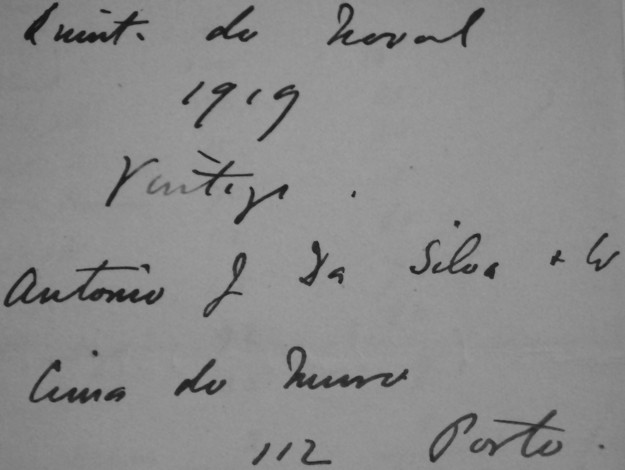
Re: Quint. do Noval 1919: a question of handwriting
Posted: 23:46 Fri 18 Oct 2013
by DRT
There is a "Rua Cima do Muro" in Oporto. Perhaps connected?
Re: Quint. do Noval 1919: a question of handwriting
Posted: 23:53 Fri 18 Oct 2013
by jdaw1
In the context of ‟Antonio J Da Silva & W !”, I’d expect that what comes next is the remainder of the name of a person, rather than the name of a street.
Quint. do Noval 1919: a question of handwriting
Posted: 23:54 Fri 18 Oct 2013
by djewesbury
jdaw1 wrote:In the context of ‟Antonio J Da Silva & W !”, I’d expect that what comes next is the remainder of the name of a person, rather than the name of a street.
But it looks like an address. "112 Porto" seems to refer to a premises number or similar; a continental style of putting building number after street name or something; or an early postcode. I would have plumped for Muro also.
Re: Quint. do Noval 1919: a question of handwriting
Posted: 23:55 Fri 18 Oct 2013
by DRT
jdaw1 wrote:In the context of ‟Antonio J Da Silva & W !”, I’d expect that what comes next is the remainder of the name of a person, rather than the name of a street.
This was 1921. Many streets have been re-named (or newly-named) since 1921 using the names of local, national or global celebrities. Mr W Cima do Muro might have left a longer impression on Oporto than he had planned.
Re: Quint. do Noval 1919: a question of handwriting
Posted: 23:58 Fri 18 Oct 2013
by djewesbury
But "Cima do Muro" means "fence". That is not anybody's name.
Re: Quint. do Noval 1919: a question of handwriting
Posted: 23:58 Fri 18 Oct 2013
by DRT
djewesbury wrote:jdaw1 wrote:In the context of ‟Antonio J Da Silva & W !”, I’d expect that what comes next is the remainder of the name of a person, rather than the name of a street.
But it looks like an address. "112 Porto" seems to refer to a premises number or similar; a continental style of putting building number after street name or something; or an early postcode. I would have plumped for Muro also.
By George you've got it!
The "W" is "Co", as in "A da Silva & Co". "Cima do Muro, 112 Oporto" is the firms address.
Re: Quint. do Noval 1919: a question of handwriting
Posted: 00:01 Sat 19 Oct 2013
by djewesbury
DRT wrote:djewesbury wrote:jdaw1 wrote:In the context of ‟Antonio J Da Silva & W !”, I’d expect that what comes next is the remainder of the name of a person, rather than the name of a street.
But it looks like an address. "112 Porto" seems to refer to a premises number or similar; a continental style of putting building number after street name or something; or an early postcode. I would have plumped for Muro also.
By George you've got it!
The "W" is "Co", as in "A da Silva & Co". "Cima do Muro, 112 Oporto" is the firms address.
Mystery solved. This is a better quiz.
Re: Quint. do Noval 1919: a question of handwriting
Posted: 00:02 Sat 19 Oct 2013
by DRT
[url=http://users.telenet.be/piet.vercaempst/Reizen/Documenten/Porto1.htm]Here[/url] someone wrote:3. The so-called ‟Ferdinand” wall began in 1336, in the time of D. Afonso IV, and it was finished in 1734, during the reign of D. Fernando; hence its name. Within the route we are taking, the wall (that came from the Virtudes and running parallel to the Escadas do Caminho Novo ”“ Caminho Novo Staircase), stretched all the way to the Porta Nova or Nobre (disappeared in 1872), round the area of the Muro dos Bacalhoeiros and continued through the riverside to the Guindais, climbing up towards the Postigo de Sto. António do Penedo (which would be replaced by the so-called Porta do Sol in 1767/69).
Apart from the Porta da Ribeira (disappeared in 1821), there were several other postigos (peepholes) in the mentioned perimeter: Postigo dos Banhos, Postigo do Pereira or da Lingueta, Postigo do Carvão, Postigo do Peixe, Postigo do Pelourinho, Postigo da Forca, Postigo da Madeira or da Lada, Postigo da Areia or dos Tanoeiros.
There was a time when the people’s function of defending the wall became unimportant, and as of that moment houses began to be built back to back with the wall. The road that led to these houses began, thus, to be called Cima do Muro da Ribeira (on top of the Ribeira wall), later obtaining the name of Rua de Cima do Muro (Street of the Top of the Wall). This is where one finds the house linked to the image of Gomes de Sá, which is located among the interesting groups of houses overlooking the Muro (Wall).
One must also refer the existence of the Cais da Estiva (Estiva Quay) to the west, which was the city’s main anchorage until the 19th century and served the traffic of the Customhouse
Re: Quint. do Noval 1919: a question of handwriting
Posted: 00:04 Sat 19 Oct 2013
by DRT
djewesbury wrote:This is a better quiz.
Agreed.
Re: Quint. do Noval 1919: a question of handwriting
Posted: 00:16 Sat 19 Oct 2013
by jdaw1
DRT wrote:The "W" is "Co", as in "A da Silva & Co".
You have found the key. Well done team.
Re: Quint. do Noval 1919: a question of handwriting
Posted: 21:07 Wed 24 Dec 2014
by jdaw1
Another reading problem. The camera failed to focus properly on a page — my responsibility is not denied.
Several photographs follow. The first is as-original. Subsequent pictures have had brightness and contrast changed, in the hope that might help.
The line probably starts “Three Dozen Bottles of”, mostly in small capitals. But what’s the Port?






(I have a guess, but want it independently verified.)
Re: Quint. do Noval 1919: a question of handwriting
Posted: 21:10 Wed 24 Dec 2014
by djewesbury
It's either Dolamore or Delaforce. Do you know what the year is likely to be?
Quint. do Noval 1919: a question of handwriting
Posted: 21:11 Wed 24 Dec 2014
by djewesbury
1929?
EDIT: or 1919…
Re: Quint. do Noval 1919: a question of handwriting
Posted: 21:17 Wed 24 Dec 2014
by djewesbury
Delaforce. Definitely.
Re: Quint. do Noval 1919: a question of handwriting
Posted: 21:23 Wed 24 Dec 2014
by PhilW
Agree, definitely Delaforce, probably 1919, can't make out the three small marks under Delaforce, could be "de la C'te" but that's just a guess, could be many other things also.
Re: Quint. do Noval 1919: a question of handwriting
Posted: 21:36 Wed 24 Dec 2014
by djewesbury
I believe those marks are a price in LSD.
Re: Quint. do Noval 1919: a question of handwriting
Posted: 00:02 Thu 25 Dec 2014
by jdaw1
jdaw1 wrote:(I have a guess, but want it independently verified.)
My guess was Delaforce 1919, partly because the next parcel of lots was halves of Df19. So we agree.
Thank you for helping.
Re: Quint. do Noval 1919: a question of handwriting
Posted: 09:02 Thu 25 Dec 2014
by djewesbury
A pleasure. Happy Xmas.
Re: Quint. do Noval 1919: a question of handwriting
Posted: 11:57 Sun 04 Jan 2015
by jdaw1
Another question for our resident handwriting experts.
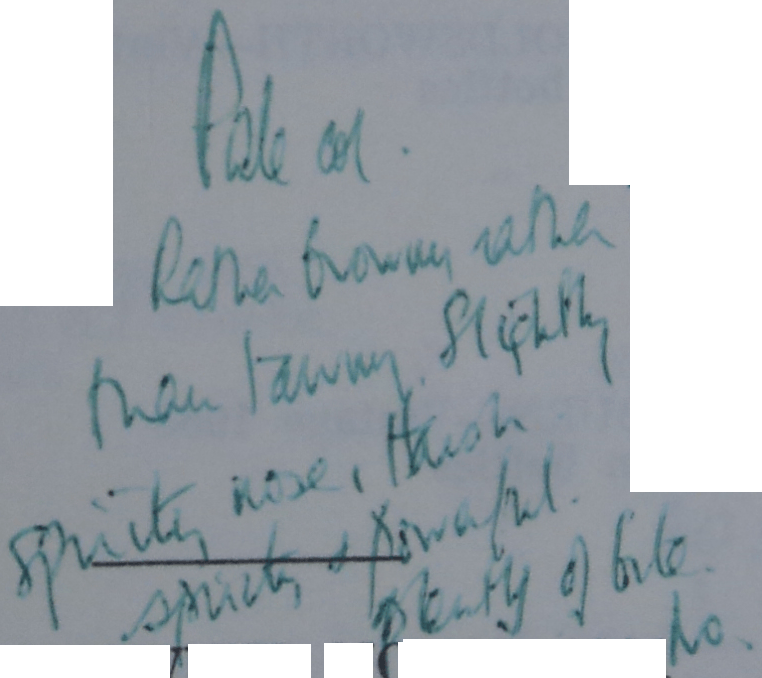
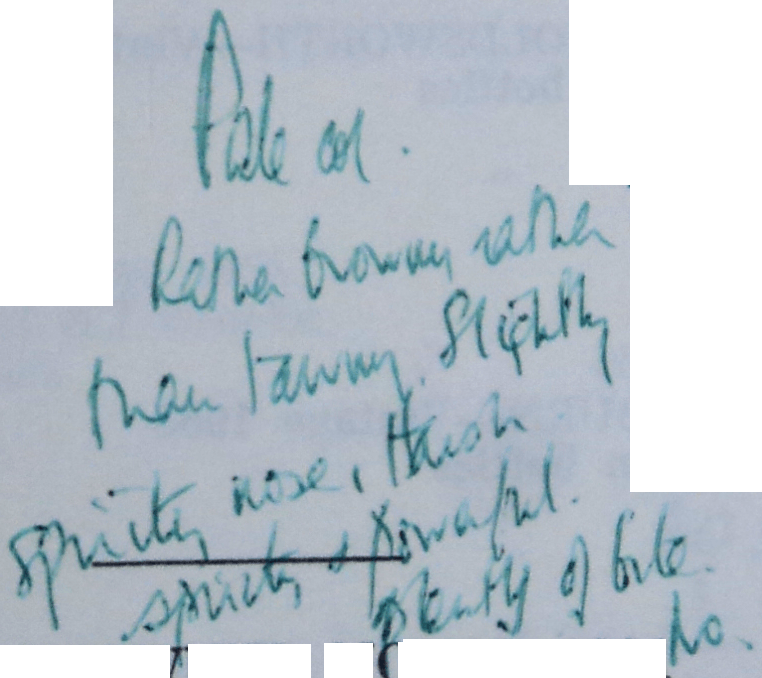
An unknown hand perhaps wrote:Pale col. Rather brown rather than tawny. Slightly spirity nose, Harsh spirity & powerful. Plenty of bite. ??.
Quint. do Noval 1919: a question of handwriting
Posted: 12:01 Sun 04 Jan 2015
by djewesbury
The last part looks like it may be 'do', as in 'ditto', but that doesn't make sense. It doesn't seem to be a number (score).
EDIT: "Unless it's 10." (RAB)
Re: Quint. do Noval 1919: a question of handwriting
Posted: 12:31 Sun 04 Jan 2015
by flash_uk
Pale col.
Rather brown rather than tawny
Slightly spirity nose, harsh, spirit and powerful
Plenty of bite
So I agree.
Re: Quint. do Noval 1919: a question of handwriting
Posted: 12:34 Sun 04 Jan 2015
by djewesbury
But the question concerns the last two marks.
Re: Quint. do Noval 1919: a question of handwriting
Posted: 12:37 Sun 04 Jan 2015
by AW77
Perhaps it's just a typo that was caused by the haste in which tasting notes sometimes are written. I would suggest 'Plenty of bite to[o]' (with the last 'o' simply missing).
Re: Quint. do Noval 1919: a question of handwriting
Posted: 12:40 Sun 04 Jan 2015
by PhilW
jdaw1 wrote:An unknown hand perhaps wrote:Pale col. Rather brown rather than tawny. Slightly spirity nose, Harsh spirity & powerful. Plenty of bite. ??.
Minor correction - I think it says "Rather brown
y rather than tawny.". The final word looks like "do" or possibly "no" but difficult to tell; am assuming the cropped area to its immediate left is not of assistance in this regard?
Re: Quint. do Noval 1919: a question of handwriting
Posted: 12:42 Sun 04 Jan 2015
by djewesbury
I think the main body of the text is correct and a letter here or there makes no difference to the general tenor. Yes, browny, not brown. But the last 'do' must refer to a repeated opinion from the previous note. This is from the Christie's catalogues, no? I recognise the handwriting from your previous posts. So perhaps a final comment that echoes that already given previously.
Re: Quint. do Noval 1919: a question of handwriting
Posted: 12:44 Sun 04 Jan 2015
by jdaw1
PhilW wrote:am assuming the cropped area to its immediate left is not of assistance in this regard?
Correct. All the green ink is shown.
Re: Quint. do Noval 1919: a question of handwriting
Posted: 12:44 Sun 04 Jan 2015
by djewesbury
AW77 wrote:Perhaps it's just a typo that was caused by the haste in which tasting notes sometimes are written. I would suggest 'Plenty of bite to[o]' (with the last 'o' simply missing).
-1. There's a full stop after 'bite' and the form of the letter is definitely 'd' to my eyes.
Re: Quint. do Noval 1919: a question of handwriting
Posted: 12:51 Sun 04 Jan 2015
by PhilW
djewesbury wrote:There's a full stop after 'bite'
Agree.
djewesbury wrote:and the form of the letter is definitely 'd' to my eyes.
I'm less definitive; it could be "do", but I think "no" is viable also, and given the preceeding note would make sense if this were someones personal notes (do I buy or not based on the tasted sample, perhaps). If this were a handwritten catalogue then "no" would seem to make less sense as an option, however.
Re: Quint. do Noval 1919: a question of handwriting
Posted: 12:52 Sun 04 Jan 2015
by djewesbury
Have a look at the last posts in the Christie's threads, Phil. These seem to be the notes of the specialist given the arduous task of assessing the wines on sale.
Re: Quint. do Noval 1919: a question of handwriting
Posted: 12:56 Sun 04 Jan 2015
by jdaw1
PhilW wrote:if this were someones personal notes (do I buy or not based on the tasted sample, perhaps)
This catalogue is at Christie’s, so is presumably that of Christie’s staff, who really shouldn’t be buying for themselves.
Re: Quint. do Noval 1919: a question of handwriting
Posted: 13:16 Sun 04 Jan 2015
by PhilW
I had a look at other posts, but to no further illumination. Might an image of any preceding or following handwritten comment(s) in the same document be of help?
Re: Quint. do Noval 1919: a question of handwriting
Posted: 13:27 Sun 04 Jan 2015
by jdaw1
And I’ve asked
the obvious question in 1?@aT.
Re: Quint. do Noval 1919: a question of handwriting
Posted: 15:06 Sun 04 Jan 2015
by DRT
I think it is "No". There is similarity to the way "no" at the beginning of "nose" is written a few lines above. The upper v lower case difference might explain why they are not identical.
I also think it is "No" because the note is not complimentary. Perhaps the lot was rejected?
Re: Quint. do Noval 1919: a question of handwriting
Posted: 15:52 Sun 04 Jan 2015
by jdaw1
Thank you. It seems people generally read it as I did. Next up, from a catalogue of 22 July 1976, Morgan 1950:
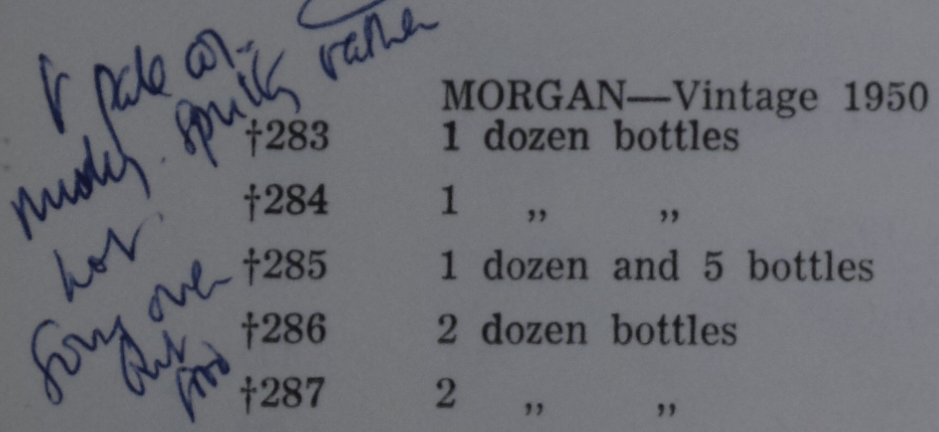
and Morgan 1960:
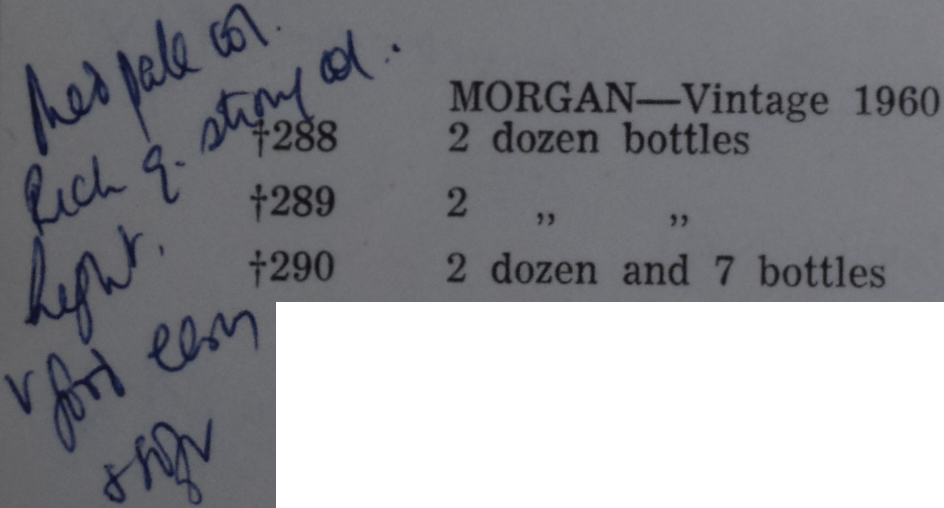
Re: Quint. do Noval 1919: a question of handwriting
Posted: 16:46 Sun 04 Jan 2015
by DRT
Very pale col. Musty. Spirity rather hot. Funny one but good.
Red pale col. Rich & straw col. Light. V ford easy & n?v
I think "v ford" is "very forward" - should this go in apostrophe crimes?
Quint. do Noval 1919: a question of handwriting
Posted: 17:08 Sun 04 Jan 2015
by djewesbury
No no. You're misreading all the "g"s.
Very pale col. Musky. Spirity rather hot. Going over but good.
Med pale col. Rich q. strong col [? He's already described the colour; I think this is different, also the "o" is formed differently]. Light. V good easy & soft.
Re: Quint. do Noval 1919: a question of handwriting
Posted: 17:22 Sun 04 Jan 2015
by PhilW
Hmm. Another variation:
V pale col.
Murky. Spirity rather
hot
funny one but good
Med pale col.
Rich q. strong col. .
v good tasty
+ soft
(admittedly the "one" looks more like "over" and "tasty" like "easy", but there are significant variations of the same letter within these notes, so that would be my best interpretation).
Re: Quint. do Noval 1919: a question of handwriting
Posted: 18:12 Sun 04 Jan 2015
by djewesbury
Definitely not funny. That is a "g". Look at the other confirmed "g"s. It's the way I write my "g"s.
Definitely not easy. Not enough characters. E a s y.
Re: Quint. do Noval 1919: a question of handwriting
Posted: 18:14 Sun 04 Jan 2015
by jdaw1
Mg60: “Red pale col” or “Med pale col”?
Re: Quint. do Noval 1919: a question of handwriting
Posted: 18:15 Sun 04 Jan 2015
by djewesbury
Med. Incontrovertible.
Re: Quint. do Noval 1919: a question of handwriting
Posted: 18:16 Sun 04 Jan 2015
by djewesbury
See the "R" on following line.
Re: Quint. do Noval 1919: a question of handwriting
Posted: 18:21 Sun 04 Jan 2015
by jdaw1
Having read the suggestions my best understandings are:
• Mg50 — “V pale col. Musky. Spirity rather hot. Fiery one but good”.
• Mg60 — “Med pale col. Rich & straw col. Light. V fwd easy & soft”. Of this, the word I think most open to challenge is the “soft”.
Re: Quint. do Noval 1919: a question of handwriting
Posted: 18:22 Sun 04 Jan 2015
by RAYC
jdaw1 wrote: Musky
Rather than "musty"?
Re: Quint. do Noval 1919: a question of handwriting
Posted: 18:31 Sun 04 Jan 2015
by RAYC
jdaw1 wrote:
• Mg60 — “Med pale col. Rich & straw col.
The two "col."s do not look like the same word to me
Re: Quint. do Noval 1919: a question of handwriting
Posted: 18:34 Sun 04 Jan 2015
by jdaw1
RAYC wrote:jdaw1 wrote:
• Mg60 — “Med pale col. Rich & straw col.
The two "col."s do not look like the same word to me
They do to me.
RAYC wrote:jdaw1 wrote: Musky
Rather than "musty"?
I’m persuaded.
Having read the suggestions my new best understandings are:
• Mg50 — “V pale col. Musty. Spirity rather hot. Fiery one but good”.
• Mg60 — “Med pale col. Rich & straw col. Light. V fwd easy & soft”. Of this, the word I think most open to challenge is the “soft”.
Re: Quint. do Noval 1919: a question of handwriting
Posted: 18:43 Sun 04 Jan 2015
by djewesbury
No. I can only say that you are all misreading the "g"s.
Re: Quint. do Noval 1919: a question of handwriting
Posted: 18:47 Sun 04 Jan 2015
by djewesbury
I attach this sample to prove my point.

Re: Quint. do Noval 1919: a question of handwriting
Posted: 18:47 Sun 04 Jan 2015
by RAYC
jdaw1 wrote:
• Mg60 — “Med pale col. Rich & straw col. Light. V fwd easy & soft”. Of this, the word I think most open to challenge is the “soft”.
For reasons Daniel states, I also think "V good" rather than "V fwd" (and to me the word looks the same as the last word in the previous note on Morgan 60)
Re: Quint. do Noval 1919: a question of handwriting
Posted: 18:57 Sun 04 Jan 2015
by djewesbury
The two "o"s in "good" could not be a "w", even though the loop of one is almost completely closed.













